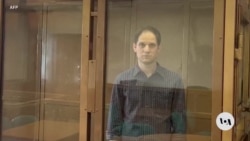For the past year, Evan Gershkovich has been confined to a small prison cell, similar in size to the jail’s courtyard — measuring six paces by six paces — that he is allowed in for just one hour each day.
To keep his mind active, he reads and meditates. To keep his body healthy, he exercises, says his sister, Danielle Gershkovich.
Stretching out the time in Russian custody, the 32-year-old reporter for The Wall Street Journal reads letters from his family and well-wishers, meets with his Russian legal team, has occasional visits from the U.S. ambassador, and attends court hearings.
At the latest on Tuesday, a Moscow court ordered that Gershkovich be held in pre-trial detention for another three months.
Friday marks one year since Russian police detained The Wall Street Journal reporter in the city of Yekaterinburg, about 1,600 km east of Moscow, on espionage charges widely viewed as bogus.
To date, the Russian government has not provided any evidence to substantiate its charges, which carry a sentence of up to 20 years in prison.
While Gershkovich is forced to wait in a Russian cell, his family and colleagues are in a constant media blitz, raising awareness about his case and trying to hasten negotiations for his release.
His family members say they are taking it day by day.
“We look at Evan, and we’re just in awe — really amazed by him,” his sister told reporters in Washington earlier in March.
The siblings write regularly, Danielle Gershkovich said, adding, “We talk all the time about how much we miss each other. He misses us desperately.”
The one-year mark since his arrest is a somber opportunity to spotlight Gershkovich’s case and the need for his immediate release, said Paul Beckett. As the Journal’s Washington-based assistant editor, Beckett is leading the newspaper’s campaign to secure the reporter’s release.
“Life moves on. The world moves on. And it hasn’t really for Evan. He’s been in the same cell, 23 hours a day,” Beckett told VOA at the Journal’s Washington bureau.
To keep attention on the case, the Journal staged swims in solidarity with the reporter at beaches named Brighton around the world. Gershkovich has ties to the Brighton beaches in both New York and Britain.
The newspaper is also hosting a 24-hour read-a-thon of Gershkovich’s work at the outlet’s New York headquarters this week.
Gershkovich, whom the United States has declared wrongfully detained, is the first American journalist jailed in Russia on spying accusations since the Cold War. The arrest highlights threats facing press freedom globally, Beckett said.
“It’s certainly a reminder for all of our reporters who are in dangerous places that journalism is a risky business,” Beckett told VOA. “It is a noble and valued endeavor that some governments in the world really don’t like.”
His arrest — and that of Russian-American journalist Alsu Kurmasheva — have a chilling effect on foreign media still in Russia, analysts said.
Kurmasheva, an editor at VOA’s sister network, Radio Free Europe/Radio Liberty, has been held in Russia since October 2023 on charges of not registering as a foreign agent and spreading false information about the Russian army. She and her employer have rejected the charges.
Such jailings highlight the poor state of press freedom in Russia. At the end of 2023, the Committee to Protect Journalists, or CPJ, ranked the country as the fourth worst for imprisoning media workers, with 22 behind bars.
Russia’s foreign ministry and Washington embassy did not reply to VOA’s emails requesting comment.
Speaking after Tuesday’s court hearing, the U.S. ambassador to Russia, Lynne Tracy, condemned the decision to extend Gershkovich’s custody.
“Evan’s case is not about evidence, due process, or rule of law. It is about using American citizens as pawns to achieve political ends,” Tracy said outside the Moscow City Court. “Evan has displayed remarkable resilience and strength in the face of this grim situation. But it is time for the Russian government to let Evan go.”
Media watchdogs say when the case does go to trial, they doubt it will be a legitimate display of justice.
“I have no doubt that it is going to be a sham procedure just to show or pretend, once again, that there is a judiciary in Russia acting independently from the Kremlin, which is not the case, especially not in this political case,” Gulnoza Said, the CPJ’s Europe and Central Asia program coordinator, told VOA.
Still, those working on Gershkovich’s case view a trial — and a probable conviction — as necessary steps toward ultimately securing the reporter’s release through diplomatic channels.
Russian President Vladimir Putin has indicated the Kremlin would be willing to trade Gershkovich for a convicted killer jailed in Germany.
Jason Conti, general counsel for the Journal’s publisher Dow Jones, told reporters last week that the U.S. government needs to work harder to impose consequences, including sanctions, to discourage authoritarian governments from targeting journalists.
“For a country that cares and believes in a free press, we ought to put this front and center. If a reporter is taken and designated as wrongfully detained, there needs to be a consequence right away from the U.S. government,” he said.
Despite having never met Gershkovich in person, Beckett says he has come to know the reporter through conversations with his family, friends and colleagues.
“We knew he was an excellent reporter. He’s turned out to be an extraordinary young man, in terms of resilience and fortitude in the face of all this,” Beckett said.








